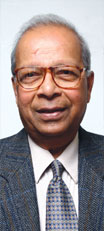 At present, one type of extremism in Nepal is providing fertile land for another type. This has resulted into deepening of mistrust. This situation is favourable neither to the people nor to the king. One type of extremism has been inspiring the king to be an active monarch which in turn is indirectly helping the anti-monarchist extremism. The two extremisms have combined to yield the same result: elections have been delayed and there is no reconciliation. Even foreigners have been saying that all forces should get together to solve our problem.
At present, one type of extremism in Nepal is providing fertile land for another type. This has resulted into deepening of mistrust. This situation is favourable neither to the people nor to the king. One type of extremism has been inspiring the king to be an active monarch which in turn is indirectly helping the anti-monarchist extremism. The two extremisms have combined to yield the same result: elections have been delayed and there is no reconciliation. Even foreigners have been saying that all forces should get together to solve our problem. The environment for reconciliation should have been made by both the sides. Both the king and the political parties need to use appropriate language for resolution. If the two sides are really willing to patch up, the last speech of the king on the occasion of democracy day can be a basis for such reconciliation. Of course, if you don't want reconciliation then you can find many faults with the speech.
The king is under pressure to find a way out. For dialogue, the two sides need to focus on activating the constitution. In the past, we used to hear arguments that a conducive environment had to be made for elections or that the House of Representatives had to be restored briefly. But now the issue of the house restoration has simply fizzled out. Now that we only hear declaration of a decisive fight, the situation is becoming more and more complicated.
There are hints that the king realises the need for dialogue. In the last one year, there has been a sea of change in the situation. Even if you need a democracy with the king, the constitution has to be activated. Of course, if you are for democracy without the king then there is really nothing to be said.
Under the present polity, how far can we constrain the king? How much of the illusions about traditional powers of the king can be gradually removed? We have the power to address these issues through parliament. If the king continues to be a hurdle even then, we can have a public discussion. But in absence of the parliament, how would the discussion about the relevance of monarchy achieve any result?
We can go on talking intellectually but that is a luxury. The understanding Nepal's geopolitical realities also shows support for the monarchy. For constituent a assembly or referendum, or even the restoration of the House, it is the king who has to be the medium. In a peaceful political course, one may choose to accept the king or reject him. But the king remains the lifeline of the present geopolitical reality.


